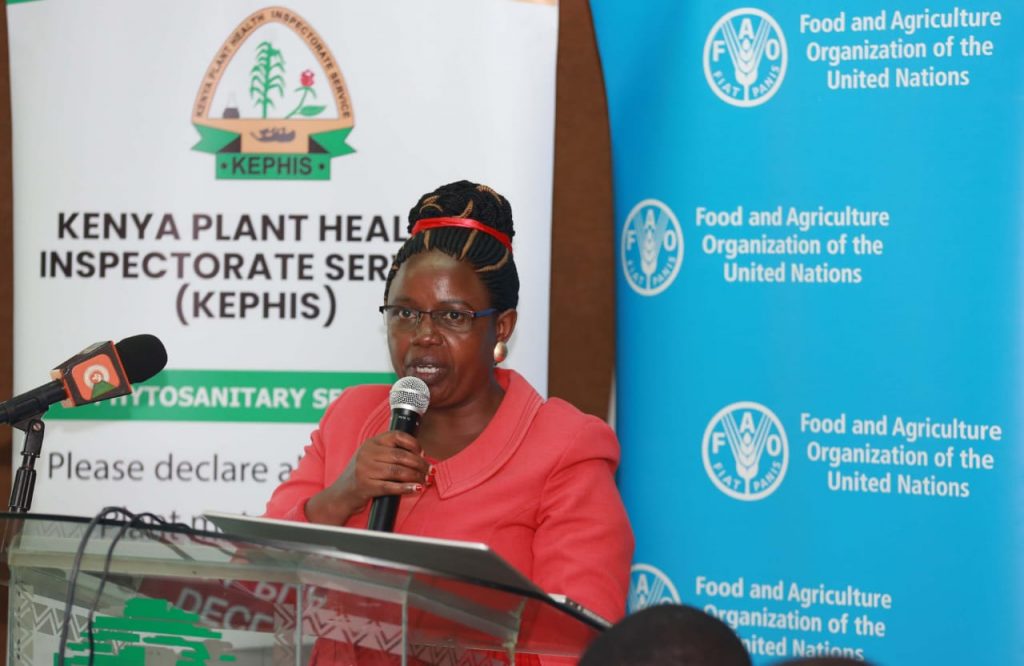Food security and safe trade could only realized through establishment a vibrant plant health and phytosanitary system in the country, Director, Plant Protection & Food Safety Directorate, Ministry Of Agriculture and Livestock Development Collins Marangu has said.
The Ministry of Agriculture, he added has been in the forefront in enhancing Kenya’s phytosanitary systems and has recently finalized the a policy to anchor the concept.
In a speech read on his behalf by the Deputy Director Teresia Karanja during closing workshop of validating the Phytosanitary Capacity Evaluation (PCE) results for Kenya, the Director said that the recent introductions of pests such as the Maize Lethal Necrotic Disease (MLN), False Codling Moth, and Fall Army Worm and re-emergence of pests such as Desert locust warrant a review of the phytosanitary capacity to identify areas that need to be strengthened.
“The impacts of plant pests are widespread and affect agriculture, the environment and society in general. Some of these pests have the capacity to directly damage the agricultural crops, natural environment, and social amenities”, Marangu said .
He added that rural communities are the most adversely impacted due to loss of earnings from lower yields or destruction of crops due to pests and thus the driving force in evaluating the phytosanitary capacity of Kenya and proposing progressive solutions.
“This evaluation process is timely and with the diverse expertise input that has been provided , the outcome of the exercise will be a comprehensive reflection of challenges in the phytosanitary system in Kenya”, he said.

The Ministry of Agriculture, Marangu said, is committed to supporting KEPHIS in the implementation of the identified action points/clear strategies that require to be implemented in order to enhance the phytosanitary capacity of Kenya.
The Director thanked International Plant Protection Convention (IPPC) for supporting Kenya to evaluate its phytosanitary capacity and also FAO for their continued support of various programmes within the country including the management of fall army worm and locusts.
Kenya Plant Health Inspectorate Service (KEPHIS) Managing Director Prof. Theophilus Mutui, said the PCE purpose is to enhance phytosanitary systems by strengthening the National Plant Protection organizations (NPPOs) capacities and resources.
“PCE process helps identify how to address the critical gaps based on the results of applying appropriate results base management tools coupled with strategic planning and logical framework methodologies”, he noted.
Prof Mutui explained that with the support of IPPC , they have been able to find those gaps and have come up with an action plan whereby the development partners can be able to look at the proposed action plan and come in to support us to be able to improve the phytosanitary system in Kenya
“The phytosanitary system in Kenya is very important because it enables us to trade in plants and products which are safe or free from pests and diseases, resulting in compliance to international market requirements and this process has been very critical because it will lead us to have the best international practices and have the national compliance to international obligations under the IPPC convention”, he said
One of the gaps which has been identified in the PCE, prof. Mutui said it has been the legal regulatory framework. “Our plant protection bill is very old and for that reason it was recommended that we need to review the bill as well as the phytosanitary policy”..
“ The cabinet approved the national phytosanitary policy and we are going to lodge this very soon possibly alongside our strategic plan . We have come up with a draft plant protection bill which shows how we are going to implement the regulation of plant and plant products to ensure that we prevent introduction of foreign pests and diseases from coming to our countries and also issues of disease surveillance”, he said
He noted that three PCE missions have been conducted in Kenya between June and November 2023, with the participation of relevant stakeholders to identify weaknesses of the phytosanitary system of Kenya and suggest possible solutions to gaps for enhancing the phytosanitary capacity of our Country.
“The PCE assessment has considered 13 modules which cover all the aspects of the NPPO in view of identification of the existing gaps in our phytosanitary capacity. The evaluation has identified some key outputs that upon implementation, strengthen the phytosanitary system for the protection of member state plant health and biodiversity, enhance safe trade, income and contribute to food security”, Prof Mutui said.
The MD noted that with a good phytosanitary system, Kenya will be able to access all the markets in the world.
UN Food and Agriculture Organization (FAO) Program Associate Stanley Kimere said phytosanitary capacity evaluation is a very, very important milestone, especially at the country level in addressing food safety.
So once we strengthen our phytosanitary capacity here in Kenya, and our neighboring countries also do the same, the FAO representative said we will be able to ensure that we mitigate the issue of the pest spreading from one place to the other and that will also now promote our food safety.
“We say in our field that without food safety, there is no food security but through the experts who came to support, we can now see the results of that evolution which has already identified the gaps and maybe of common weaknesses on where we need to be and now we deliberately also need to mobilize resources to be able to implement the priorities that have been identified”, Kimere said
The support to Kenya to evaluate its phytosanitary capacity that was funded by the European Union was based on the request made by KEPHIS to undertake the phytosanitary capacity evaluation in Kenya this year after the evaluation had been partially carried out in 2018.
Kenya is known widely for export of horticultural products. Currently it is able to access avocado markets for China, India, Malaysia, and many other countries. Kenya is also a leading exporter of cut flowers to the European Union.
By Wangari Ndirangu,



